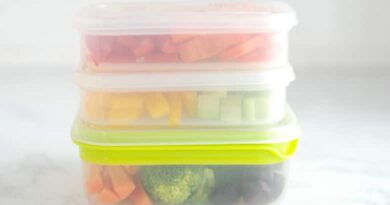The best foods to feed your sick toddler, according to a pediatric dietitian
Just as the holiday zaniness comes to an end and your toddler is finally back in school, suddenly—bam! Sick season kicks in. Whether it’s dealing with stuffy noses and sniffles, sad little coughs, upset tummies, or sore throats (or all of the above), it feels like sick season goes on forever. Luckily, nutrition plays a role in supporting immunity, promoting hydration and kicking those pesky bugs far out the door.
When it comes to nourishing toddlers during illness, their eating habits are likely to change. Don’t expect them to eat with the same gusto or variety as they did when they were healthy. They may go for smaller portions, be a tad crankier at meals, or become more selective about what they choose to eat (cut them some slack if broccoli ends up on the floor!). While they’re feeling blah, focus on nutrient-dense foods, ensuring each bite packs a punch of calories and nutrition. Most importantly, ensure your toddler is hydrated throughout the day. Hydrating replenishes lost fluids if your toddler has been dealing with bouts of vomiting.
Here’s a list of nourishing foods to feed your sick kiddo: they’re not magical cures, but when paired with plenty of fluids and enough rest, they provide essential nutrients to combat illness and provide tasty nourishment even when they aren’t feeling their best.
The 5 best foods to feed your sick toddler
1. Dragon fruit
Dragon fruit is loaded with vitamin C, and while it’s a common misconception that vitamin C cures the common cold, its antioxidant properties play a huge role in supporting immunity. Forget about scavenging specialty food stores for fresh dragon fruit; just head to your local grocery store and you’ll likely spot frozen dragon fruit, or pitaya, chilling in the freezer section. We love tossing dragon fruit into smoothies because the cold sensation works wonders on scratchy throats. Dragon fruit isn’t just a hit for its eye-catching, vibrant hue (which toddlers go gaga over!); it’s also super hydrating thanks to its high water content.
2. Oatmeal
We’re a fan of cozy, warm oatmeal because it’s not only mushy and soft but also scores extra points for being rich in protein. Whip it up with whole milk for a dish packed with both fat and calories. For kiddos who have an upset stomach, choose instant oat varieties, which usually have lower amounts of fiber, making them easier to digest. Throw in some sliced bananas or mix in nut butter to amp up calories, and if your toddler’s belly is on the upswing, toss in some chia, hemp seeds or ground flaxseeds for those extra Omega-3s which can help reduce inflammation.
3. Greek yogurt
Yogurt, a classic toddler favorite, comes loaded with immune-supporting probiotics. Opt for Greek yogurt which is higher in protein and choose unsweetened, plain varieties to dodge unnecessary added sugars. If your kiddo is craving a little extra sweetness, add a drizzle of honey (only for kiddos over age 1) which not only adds flavor but also brings along antioxidants and antimicrobial and antibacterial properties. Plus, honey does wonders for soothing those lousy sore throats.
4. Potatoes
Look at that—a beige food for the win! When kids are sick they naturally gravitate towards their favorite comfort foods, which usually involves simple starches. Potatoes are the perfect example of bland, simple carbs that are gentle on the stomach and easy to digest. From mashed to twice-baked potatoes, it’s hard to go wrong. A quick tip: stay clear of French fries or fried potatoes because oily foods tend to sit in the stomach longer, making an upset stomach even more upset.
5. Pancakes
Typically a toddler favorite (my kids joyfully squeal every time I serve them!), pancakes aren’t just a tasty breakfast food—they’re a well-balanced meal in one. Pancakes are a wholesome combination of protein from eggs, carbs from flour, and fat from the cooking process (consider baking if your child’s stomach is sensitive). Flavor them with blueberries or raspberries for additional antioxidants, or mix ground flaxseeds into the batter for anti-inflammatory Omega-3s. Here’s a bonus tidbit: If your little one shies away from eggs during illness, pancakes provide a palatable way to offer eggs and extra protein; essential for the healing process.




